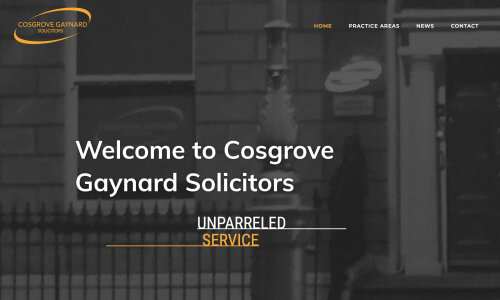Best Due Diligence Lawyers in Ireland
Share your needs with us, get contacted by law firms.
Free. Takes 2 min.
Or refine your search by selecting a city:
List of the best lawyers in Ireland
About Due Diligence Law in Ireland
Due Diligence in Ireland refers to the thorough investigation or inspection of a business or individual before entering into a contract or agreement. This process is essential in identifying potential risks and ensuring informed decision-making in transactions such as mergers, acquisitions, or investments. In Ireland, due diligence is a critical component of corporate governance and compliance, focusing on verifying all aspects of a company's operations, including legal, financial, and operational areas.
Why You May Need a Lawyer
Engaging a lawyer is often crucial when dealing with due diligence for several reasons:
- To ensure compliance with Irish laws and regulations during business transactions.
- To navigate complex legal documents and identify any potential liabilities or red flags.
- To negotiate terms that are favorable and protect your interests in contracts.
- To assist in the comprehensive review of financial documents and company history.
- To conduct background checks and investigations that require legal expertise.
Local Laws Overview
The due diligence process in Ireland is governed by various laws that focus on corporate governance, financial regulations, and compliance. Key aspects of Irish laws relevant to due diligence include:
- Companies Act 2014: This act provides the framework for the incorporation and regulation of companies in Ireland, including the obligations of directors and officers.
- Irish Data Protection Act 2018: Compliance with data protection laws is critical, especially during due diligence when personal data handling is involved.
- Competition Act 2002: Ensures that mergers and acquisitions do not result in anti-competitive practices.
- Employment Law: Matters related to employee contracts, benefits, and terms of employment are crucial during the due diligence process to ensure compliance.
Frequently Asked Questions
What is involved in the due diligence process?
The due diligence process typically involves the examination of financial records, legal compliance, employee relations, intellectual property, contractual obligations, and company operations to assess risks and opportunities.
How long does the due diligence process take?
The duration can vary significantly depending on the complexity of the transaction. It can range from a few weeks to several months.
Who is responsible for conducting due diligence?
While the prospective buyer typically conducts due diligence, both parties often engage legal and financial professionals to assist in the process.
What are the risks of not performing due diligence?
Failing to perform due diligence can lead to undiscovered liabilities, overvaluation of assets, compliance issues, and unfavorable terms, potentially leading to significant financial loss or legal issues.
Are there standard checklists used in due diligence?
Yes, there are standard checklists tailored to specific industries or transactions. However, these are usually customized to address the unique aspects of each deal.
Can due diligence uncover fraud?
Yes, one of the aims of due diligence is to detect fraudulent activities or financial discrepancies within a company.
What role does a lawyer play in due diligence?
A lawyer provides legal guidance, reviews documents for compliance and legality, negotiates terms, and ensures that all legal aspects are thoroughly considered.
How much does due diligence cost?
The cost can vary depending on the scale and scope of the investigation, the complexity of the transaction, and the professionals involved.
Is due diligence required by law?
While not always legally required, due diligence is considered best practice, especially in corporate transactions, to mitigate risks and ensure informed decision-making.
What is the difference between legal and financial due diligence?
Legal due diligence focuses on legal compliance and contractual obligations, while financial due diligence examines financial statements, accounting practices, and economic metrics.
Additional Resources
For those seeking further information and support, the following resources can be invaluable:
- Irish Companies Registration Office (CRO): Offers access to company information and filings.
- Office of the Director of Corporate Enforcement (ODCE): Provides guidance on corporate compliance and governance.
- Irish Auditing and Accounting Supervisory Authority (IAASA): Regulates auditing and accounting standards.
- Law Society of Ireland: To find qualified legal professionals specializing in due diligence.
Next Steps
If you require legal assistance with due diligence in Ireland, consider the following steps:
- Identify and contact a solicitor or law firm specializing in corporate and commercial law.
- Prepare a list of specific questions or concerns related to your transaction.
- Gather all relevant documentation and information related to the business or transaction.
- Schedule a consultation to discuss your situation and explore your options.
Acting promptly and seeking professional advice can help ensure a smooth and successful due diligence process, protecting your interests and minimizing potential risks.
Lawzana helps you find the best lawyers and law firms in Ireland through a curated and pre-screened list of qualified legal professionals. Our platform offers rankings and detailed profiles of attorneys and law firms, allowing you to compare based on practice areas, including Due Diligence, experience, and client feedback.
Each profile includes a description of the firm's areas of practice, client reviews, team members and partners, year of establishment, spoken languages, office locations, contact information, social media presence, and any published articles or resources. Most firms on our platform speak English and are experienced in both local and international legal matters.
Get a quote from top-rated law firms in Ireland — quickly, securely, and without unnecessary hassle.
Disclaimer:
The information provided on this page is for general informational purposes only and does not constitute legal advice. While we strive to ensure the accuracy and relevance of the content, legal information may change over time, and interpretations of the law can vary. You should always consult with a qualified legal professional for advice specific to your situation.
We disclaim all liability for actions taken or not taken based on the content of this page. If you believe any information is incorrect or outdated, please contact us, and we will review and update it where appropriate.
Browse due diligence law firms by city in Ireland
Refine your search by selecting a city.















